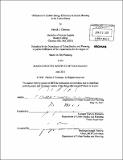Ordinances to enable energy efficiency in rental housing in the United States
Author(s)
Coleman, Patrick J., M.C.P. (Patrick Joseph). Massachusetts Institute of Technology
DownloadFull printable version (8.891Mb)
Other Contributors
Massachusetts Institute of Technology. Dept. of Urban Studies and Planning.
Advisor
Harvey Michaels.
Terms of use
Metadata
Show full item recordAbstract
Improved energy efficiency in rental housing is important from the perspectives of environmental, economic, and social policy, but upgrades to such buildings lag those of owner-occupied properties. With myriad reasons to improve the efficiency of this sector, this thesis seeks to better understand the barriers and strategies to achieve this goal. This research was inspired by recent partnerships among municipalities, community-based organizations, and utilities in Massachusetts, which create a new medium to serve the rental sector. Upon investigation of the policies of five jurisdictions throughout the United States, this thesis finds that well designed policies may 1) establish a minimum standard of energy efficiency in rental properties, 2) enable energy efficiency program administrators to focus attention beyond basic measures to deeper retrofits, and 3) facilitate the valuation of energy efficiency in housing markets. Additionally, this research presents a cross-cutting analysis of policy options, highlights key elements, and offers suggestions to complement existing efforts in Massachusetts, such as these partnerships, to improve the energy efficiency of rental properties.
Description
Thesis (M.C.P.)--Massachusetts Institute of Technology, Dept. of Urban Studies and Planning, 2011. Cataloged from PDF version of thesis. Includes bibliographical references (p. 138-144).
Date issued
2011Department
Massachusetts Institute of Technology. Department of Urban Studies and PlanningPublisher
Massachusetts Institute of Technology
Keywords
Urban Studies and Planning.